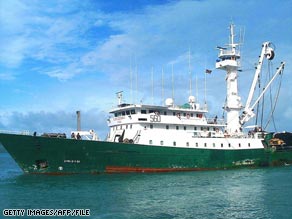
The Spanish-registered Playa de Bakio was seized by pirates off Somalia in April.
"Millions of Somalis are suffering from a combination of insecurity, drought and high food and fuel prices. If relief shipments slow down, we could face a major catastrophe," Peter Goossens, Somalia country director for the U.N. World Food Program, said.
Pirate attacks on unescorted ships have been a growing problem in Somalia. In the last several weeks, three European freighters were hijacked off the Horn of Africa adding to the 27 other reported attacks this year, according to the International Maritime Bureau, which tracks piracy.
French, Danish and Dutch warships began escorting ships to Somalia in November 2007 and, since then, none of the food program's 27 aid ships have been attacked, spokesman Peter Smerdon said. That followed a spate of attacks against humanitarian ships earlier in the year that led to concerns that the agency would have to suspend deliveries by sea, as it did for weeks in 2005 after two WFP-chartered ships were hijacked.
With the last Dutch escort mission ending on June 25, "we need to establish a pipeline of support," Smerdon said. He said the program has appealed to governments but has not received confirmation and fears that "time is running out."
Don't Miss
Currently, the agency delivers 80 percent of its aid to Somalia by sea, and Smerdon said that if there are no warships to escort the food supply, the program will have to rely on ground or air travel to deliver the food. But both are dangerous and expensive.
Driving is very time-consuming, and it could take weeks to reach the people because of armed checkpoints requiring travelers to pay fees, Smerdon said, and with the increasing civil unrest within the borders, "the road is a dangerous place to be."
Air travel hasn't been used since the last severe Somalian famine, and limits the amount of food that can be carried, Smerdon said.
The International Red Cross has predicted that Somalia's food and water shortages could leave millions at risk for starvation.

Somalia's last severe famine from 1991 to 1993 swept through the nation devastating crops, killing between 240,000 and 280,000 people and displacing up to 2 million, according to the U.N. Office of the High Commissioner for Refugees.
The agency said that if there is no assistance from naval powers, piracy will increase and so too will death and malnutrition. Smerdon said that although Somalia's food crisis hasn't yet reached the devastation of the early 1990s, "we're worried it will be."
No comments:
Post a Comment